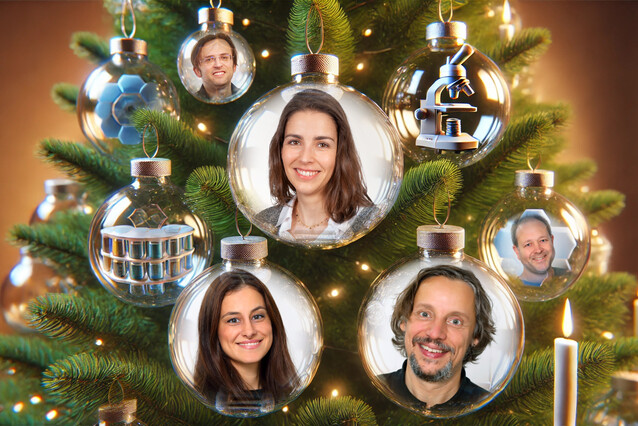Three WWTF grants for synthetic biology projects of IMP researchers
The Vienna Science and Technology Fund WWTF announced funding for three research projects led by Tim Clausen, Anna Obenauf, and Diana Pinheiro. This “funding hattrick” hails from a call for synthetic biology proposals and will support research on protein folding, gene regulation, and tissue formation.
Christmas is starting early at the IMP this year, as the Vienna Science and Technology Fund WWTF announced a decision to fund no less than three projects led by IMP scientists, all linked to research in the synthetic biology field. Scientists coordinated by Tim Clausen, Anna Obenauf, and Diana Pinheiro will receive funding for four years. Johannes Zuber and Alexander Stark are project partners, raising the total group of beneficiary labs at the IMP to five.
“Engineering synthetic enhancers and gene circuits to understand and overcome cancer therapy resistance”: over the past ten years, cancer treatments have advanced thanks to new therapies that specifically inhibit cancer cells or stimulate the patients’ immune system to fight the cancer cells. However, some tumours can evade both types of therapies by switching to novel cancer cell states that are therapy resistant and suppress the immune system. Anna Obenauf will coordinate scientists from her lab and that of Alexander Stark to combine modern genomics, artificial intelligence (AI), and synthetic biology approaches to build gene-regulatory tools that allow the monitoring of cancer cell-state switches and the stimulation of immune cells to fight the cancer cells. The research will work with established melanoma and colorectal cancer mouse models accompanied by clinical correlates. The project aims to deliver groundbreaking advancements in cancer research and pave the way for the next generation of cell- and gene-therapy-based treatments.
“Sounds of Silence – codons and chaperons in the protein folding concert”: this project, coordinated by Tim Clausen, will study how myosin, the protein responsible for muscle contraction, matures within cells. Proper folding of myosin is crucial for muscle function, but can be disrupted by subtle genetic changes, leading to diseases. The project team, which includes the labs of Johannes Zuber and Alexander Bronstein (ISTA, Klosterneuburg) has developed a molecular tool to track myosin folding in cells. Aside monitoring protein biogenesis in its native environment, this tool enables studying the folding process of over 500,000 myosin variants. Using machine learning to analyse these complex data sets, the scientists will explore how synonymous changes - genetic differences within single codons - affect protein structure and stability. In addition, the scientists will use the folding reporter to screen for chaperones, important molecular helpers involved in myosin maturation. The project will leverage advanced synthetic biology techniques to manipulate and study protein folding at an unprecedented scale. Findings from the project could build the foundation for new treatments for muscle diseases caused by protein misfolding.
“Decoding and engineering multiscale mechanoresponses in synthetic and biological tissues”: coordinated by Diana Pinheiro, the project team will study into the physical forces and mechanical properties that play central roles in shaping our organs into functional structures. Mechanical properties are crucial features of tissues in health and disease. Tumours, for example, can often be detected because they are stiffer than surrounding tissues. Despite this, scientists still know little about how to connect intuitive, large-scale mechanical features such as stiffness or viscosity to biological pathways at the molecular and cellular levels. Diana Pinheiro and her partners Roberto Cerbino (University of Vienna) and Edouard Hannezo (ISTA, Klosterneuburg) will blend approaches from physics and engineering to develop new tools capable of measuring the mechanical properties of living tissues while simultaneously imaging their molecular and cellular responses. The scientists seek to identify key determinants of tissue mechanics by reconstructing biological complexity step by step: they plan to build a continuum of materials between inert and living, and systematically compare them using an innovative mechanical assay.
About the Vienna Science and Technology Fund WWTF
The Vienna Science and Technology Fund WWTF (Wiener Wirtschafts- und Technologiefonds) is a funding body of the City of Vienna that supports outstanding scientific research. Excellent scientific projects are selected according to stringent criteria and competitive procedures. Projects receive substantial financial support from the WWTF. In addition, the funding programme takes socially relevant issues into consideration through carefully planned focus areas and promotes active networking between disciplines and institutions. WWTF seeks to “contribute to a better world through science and research”. The current call was dedicated to life sciences and specifically synthetic biology.
Further Reading
Vienna Science and Technology Fund (WWTF)
Lab of Tim Clausen
Lab of Anna Obenauf
Lab of Diana Pinheiro
